This web page presents information about the work of the IMF in Romania, including the activities of the IMF Resident Representative Office. Additional information can be found on the Romania and IMF country page, including IMF reports and Executive Board documents that deal with Romania.
Mr. Gottlieb has been appointed as the new Resident Representative for Bulgaria and Romania. He replaces Mr. Ilahi.
IMF’s Work on Romania
-
Executing a Soft Landing for a Lasting Recovery
March 15, 2024
Today’s gathering comes two years after Russia’s invasion of Ukraine, a subsequent energy-price roller coaster, and the advent of a more fragmented global economy. Against this backdrop Europe has done well, because governments acted fast and decisively. Unemployment rates have remained low, inflation has declined sharply, and the EU announced a new accession effort—stemming the tide of fragmentation.
-
IMF Staff Concludes Visit to Romania
February 1, 2024
Last year’s fiscal package was a step in the right direction and creates additional revenue. Nonetheless, we project fiscal deficits above 6 percent of GDP in the next few years, given the fiscal costs of the new pension law. New measures will be needed to reduce the deficit to sustainable levels.
-
Labor Force Participation in Romania
December 13, 2023
Author/Editor:Florian Misch | Alexander Pitt
Series:Selected Issues Paper No. 2023/062 -
Making Romania Fit and Resilient for the Net-Zero Transition
December 13, 2023
Author/Editor:Augustus J Panton
Series:Selected Issues Paper No. 2023/063 -
IMF Executive Board Concludes 2023 Article IV Consultation with Romania
December 8, 2023
The Executive Board of the International Monetary Fund (IMF) concluded the Article IV consultation with Romania, and considered and endorsed the staff appraisal without a meeting.
Regional Economic Outlook
April 19, 2024

A soft landing for Europe’s economies is within reach. Securing the baseline of growth with price stability will require careful monetary policy calibration. Faster fiscal consolidation would ensure buffers are adequate to tackle future shocks, while structural fiscal reforms would help address mounting long-term expenditure pressures. Beyond the near-term recovery, raising potential growth prospects calls for efforts at both the domestic and European levels. Measures should aim to raise labor force participation, prepare the workforce for looming structural shifts, set an enabling environment for private investment, and promote innovation on a level European playing field—especially when it comes to the green transition, including through a strong commitment to carbon pricing. Greater European integration would amplify the effect of these reforms. Formulating an ambitious set of growth-enhancing reforms should be a key priority of a new EU commission.
Read the Report



